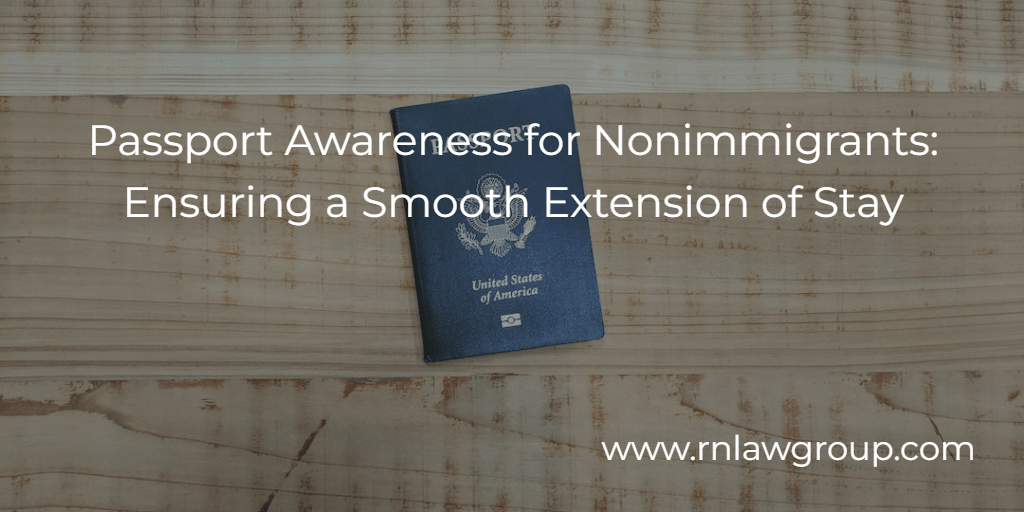
Passport Awareness for Nonimmigrants: Ensuring a Smooth Extension of Stay
Nonimmigrants are foreign nationals admitted temporarily to the United States in various temporary visa categories, such as H-1B and H-4 dependents, L-1 and L-2 dependents, O and O-3 dependents, J-1 and J-2 dependents, B-2, F-1 and F-2 dependents, etc. Each category has its own requirements to qualify as well as requirements to renew or extend status while in the United States. All nonimmigrant visa categories share a common prerequisite for extension of stay: possessing a valid passport. This means that in addition to knowing when your I-797 approval notice, I-94, and visa stamp expire, nonimmigrants in the United States should also keep track of when the passport is expiring for all family members.
U.S. regulations state that the passport of an alien applying for extension of stay must be valid at the time of application for extension … and the alien must agree to maintain the validity of his or her passport and to abide by all the terms and conditions of his extension.
If your petition or application for an extension of stay is filed with an expired passport, USCIS will likely send a Request for Evidence asking for a copy of the renewed passport to be submitted. If you did not already apply for the passport renewal before the passport expired, your renewed passport may have an issue date that is after the expiration date of the expired passport. If you were to respond to USCIS with this renewed passport, your request for extension of status can be denied. This can have major negative consequences if your prior status has already expired by the time a denial is issued. Because of this, if time permits, it may be recommended to delay the filing of your petition or application for an extension of stay until you obtain your renewed passport.
Stop and take a minute today and check your passport expiration date. Put a reminder on your calendar six months before the expiration date to remind yourself to apply for the renewal.
Another area where an expiring passport can catch nonimmigrants unaware is when traveling. For example, a nonimmigrant child of an L-1 visa holder received an L-2 visa at the U.S. consulate that is valid for three years in line with her parent’s L-1 visa. At the time of receiving the visa, the child’s passport will be expiring in two years, ie before the visa expires and before the parent’s status expires. The family travels to the United States and the parent is admitted to the United States for three years, but the child is only admitted to the United States for two years based on the expiring passport. The parent does not realize it until it is time to file the L-1 renewal with USCIS, but by that time the child’s I-94 has been expired for six months, meaning the child has been out of status and is not eligible to renew the L-2 by filing with USCIS.
The best way to avoid these kinds of situations is to always keep track of the expiration date of your passport and always check the “Admit Until Date” on you and your family members’ I-94s at https://i94.cbp.dhs.gov/I94/#/home#section every time you enter the United States on a nonimmigrant visa.
Being a nonimmigrant in the United States comes with a responsibility to be vigilant about passport expiration dates. With various visa categories and individual requirements for extension of stay, it is crucial to maintain a valid passport at all times. Neglecting to do so can lead to RFEs, denials, or even unintentional status violations, causing significant consequences for both the individual and their family members. By proactively checking passport expiration dates and keeping track of I-94 “Admit Until Dates,” nonimmigrants can stay in compliance and ensure smooth and uninterrupted stays in the United States. Taking a moment today to review passport details and setting reminders for renewal will help prevent potential issues and facilitate a stress-free immigration journey for all nonimmigrant visa holders and their dependents.
By: Emily Neumann
Emily Neumann is Managing Partner at Reddy Neumann Brown PC with over 15 years of experience practicing US immigration law providing services to U.S. businesses and multinational corporations. Emily has helped transform the firm from a solo practice to Houston’s largest immigration law firm focused exclusively on U.S. employment-based immigration. She received her Bachelor’s degree in Biology from Central Michigan University and her Juris Doctorate degree from the University of Houston Law Center. Emily is a frequent speaker and has been quoted in Bloomberg Law, U.S. News & World Report, Inside Higher Ed, and The Times of India on various hot topics in immigration. She is a member of the American Immigration Lawyers Association and Society for Human Resource Management.
Reddy & Neumann has been serving the business community for over 25 years and is Houston’s largest immigration law firm focused solely on US. Employment-based immigration. We work with both employers and their employees, helping them navigate the immigration process quickly and cost-effectively.

